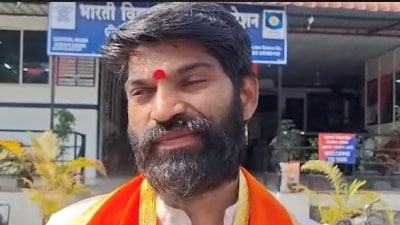Animal instinct
His films are a mirror to the kind of person he was at the time of making them, Ramgopal Varma tells Rajeev MasandJudging by the mammoth s...

His films are a mirror to the kind of person he was at the time of making them, Ramgopal Varma tells Rajeev Masand
Judging by the mammoth success of both Rangeela and Satya, were you ever tempted to repeat the same kind of film, so as to stay safe?
But that defeats the very purpose of why I want to make films8230; When I touch upon a subject, I try to get to the very bottom of it. When I made Satya, I did my research on the underworld very thoroughly. And I put in as much of that into the film, as I think is essential to convey what I want to. So for me, I8217;ve said everything I wanted to about that issue in my film. I cannot repeat the subject because I have nothing more to say. I might think of doing another film with a similar theme many years later when I land upon new information that I want to convey, but for the moment, I8217;m done with it.
Courtesy your choice of films, you have been described as unpredictable and risky8230;
I don8217;t think I8217;m risky. In fact, it is the other film-makers who repeat themselves regularly, who are taking risks. I8217;m scared of doing that.
Do you ever sit back and analyse what went wrong with a film that failed at the box-office?
I enjoy the process of making a film. The result is merely incidental. But yes, I do believe in going back and figuring out where I went wrong. Most of the time, the mistake a film-maker makes involves an important decision made at the very start. But one tends not to question that decision, and instead one tends to look at all the other smaller things and wonder whether one8217;s doing them right. That is how the mistake gets bigger and one never knows till the end8230; As far as Mast is concerned, I now realise that I ended up treating Mallika8217;s the film star character very unbelievably. It became too much of a fairy-tale narration, a Chandamama kind of story 8212; the way her family treats her, and what her life really is behind the camera8230; That was the main fault of Mast.
And what do you attribute the failure of Daud to?
To begin with, Daud was not so much a comedy as it was meant to be a spoof. I drew inspiration from MAD magazine, but I guess I failed more at getting a linear narration across. I should say here that I even analyse my successful films. For example, I don8217;t think I did full justice to Jackie Shroff8217;s character in Rangeela. Even in Satya, there are portions where I feel Bhiku Mhatre8217;s character is a little flat. When I see the film now, I find some scenes look very contrived.
Are you embarrassed about any of your films?
Yes, I8217;m very embarrassed to see a film like Raat. That was easily the most indulgent film in my career8230; I guess I8217;m embarrassed because to me, my films are a mirror to the kind of person I was at the time of making it. And that makes me embarrassed about the kind of person I was at the time. In fact, I remember Shekhar Kapoor telling me after he8217;d seen the film, that I had made Raat completely in reverse gear. He was telling me how most film-makers begin with a story, then they conceive scenes, and finally they plan individual shots. But Raat, he felt, began with a collection of shots, for which I had conceived scenes, around which an entire story was woven8230;
Have you been fully satisfied with any of your films?
Never. I might be satisfied with a scene, or with a particular sequence, or even with portions of a film, but never with film in totality.
In your opinion, should films convey a message, or should they be meant for pure entertainment?
I think they should be meant for entertainment. They might encourage a discussion, but that8217;s it. Watching a film should be like reading a good book. Yes, sometimes movies are able to say something important, but such films come only once in a while. 95 per cent of the time, there8217;s nothing deeper involved.
You worked extensively in Telugu cinema before you switched to making Hindi movies. But you haven8217;t once gone back to your roots8230;
I love Hindi cinema. I know that a good film is a good film in any language, but Hindi movies have a larger-than-life quality about them, which makes it more attractive for me.
What made you think of going into the jungles for your latest film?
I8217;ve been toying with the idea of shooting in the forests for a long time. Almost thirty years ago, I saw a film called Lost In The Desert, which was about a little boy who is separated from his parents when the plane they are travelling in, crashes in a desert. I guess the germ of the idea came from there. But I was always more interested in setting my film in a jungle. Also, one reads so much about Veerappan that it8217;s intriguing8230; In any case, the protagonist of my film is the jungle, not any actor in particular.
Are you a strict and rigid director, or do you allow your actors to interpret their roles themselves?
I depend quite heavily on my actors. I always give them a feel of what I want, and then I leave it to them to perform their way. In my opinion, when you give an actor leeway, you always get more than what you had in mind.
What is the idea behind producing films now?
There are stories that I have been excited about, but I don8217;t have the time to make all these movies. I just want to see those movies being made, so I decide to produce them myself.
Keeping in mind your body of work, there is a certain responsibility on your shoulders. There8217;s also a degree of quality attached to your name8230;
I acknowledge the responsibility, and I don8217;t shun it. In fact, I believe that film is a commercial art. Unlike books or paintings where the money involved is so minimal, films cost a lot of money to make. And I feel that if you are the sort of film-maker who is indulgent to the point where you don8217;t care whether your film runs or not, then that8217;s unethical.
There8217;s a certain grimness, even a tongue-in-cheek nature to most of your films. Are you never fascinated by such breezy romances or happy family films as say, Dilwale Dulhania Le Jayenge or Hum Aapke Hain Koun?
I don8217;t think I8217;m capable of making such films. As a person, I don8217;t relate to such movies. However, I have to say that I loved Dilwale Dulhania8230; a lot.
What does success mean to you?
If I8217;m able to make the kind of movies that I want to, then I regard myself successful. And since I haven8217;t yet had to compromise on that, I don8217;t think I have been affected by failure. Not yet, for sure.
Doesn8217;t box-office success matter at all?
Not really. It never has. But one cannot deny that with box-office success, one builds trust among the audiences. They think: quot;Shayyad abhi kuch achcha banayega!quot; And mind you, quot;shayyadquot; is the operative word here!
- 01
- 02
- 03
- 04
- 05































